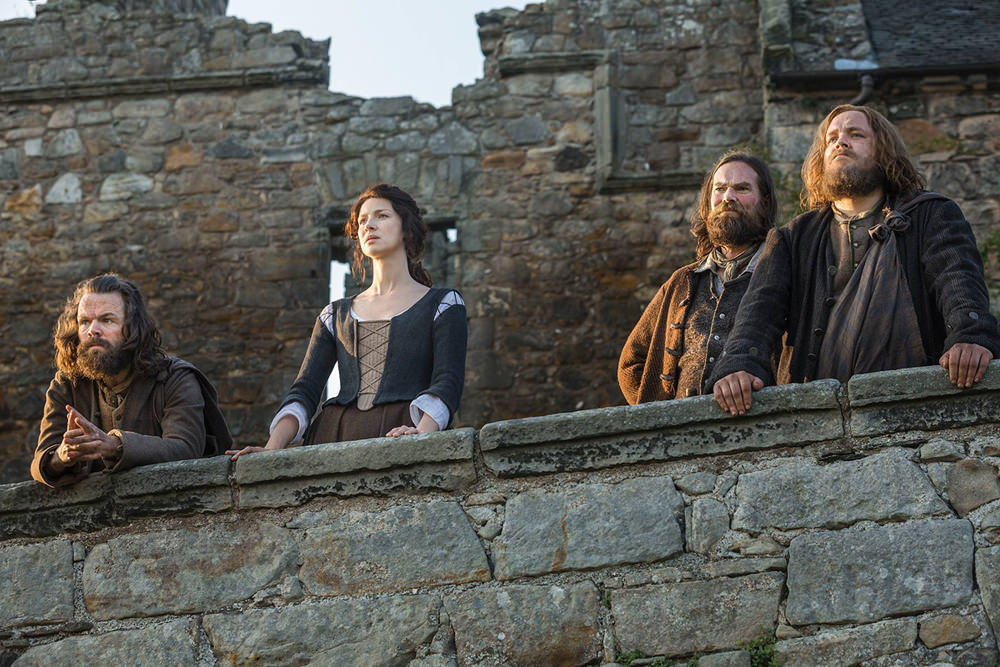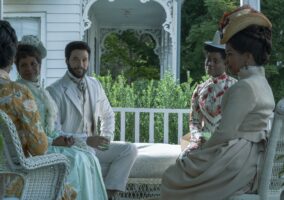 Stephen Walters, Caitriona Balfe, Duncan Lacroix, and Grant O’Rourke in “Outlander” on Starz
Stephen Walters, Caitriona Balfe, Duncan Lacroix, and Grant O’Rourke in “Outlander” on Starz
Once again, Outlander gives us the most engrossing hour of television … that we never plan to watch again. That’s not exactly surprising, since the last episode (which we are just as likely to never watch again) let us know that the horror we’d just witnessed was only a prelude for what was to come. We give this show all the credit in the world for not shying away not only from the subject matter, but from the way it truly needed to be depicted in order to give it the emotional weight it needed.
We admit it. Early in the episode, when it looked like the night of horrors in Wentworth was behind us, with Jack seemingly (but obviously not) trampled by a bunch of pissed-off Scottish cows (not wearing pearls, unfortunately) and Jamie safely whisked away, we breathed a sigh of confused relief. “Oh good. They’re not showing the whole thing.”
O we of little faith.
We should have known that this show, which at times seems to exist solely to upend gender portrayals and tropes, was not going to let us off that easily. And even though it was all awful to watch, we couldn’t tear our eyes away; first because the scenes of horror were so well-directed and acted (we honestly don’t know how Tobias Menzies and Sam Heughan managed it), but more importantly, because the show made us realize how important it was to depict these things. Too often – as in, almost always – the horror of rape is poorly depicted in our films and TV shows; either because it’s foolishly done in a titillating manner, or more frequently, the repercussions of the act are either glossed over or ignored completely. And by that we don’t mean necessarily the physical horror of watching someone exert their will over someone else’s body and the physical aftermath. It’s what rape does to its survivors after the act is over that’s the most important part. And in most fiction, that never really matters because when a female character gets raped, it’s almost always used as a tool to spur a male protagonist into action. In fiction, women get raped so that men can get angry and avenge them, thereby shifting all the focus off the survivor. Very rarely do we see rape depicted in such a way as to make the point that was made here: that rape is as much or more an act of psychological violence as it is an act of physical violence. Rape is a method of breaking another person’s will and self image – and we’ve never seen that idea depicted so thoroughly as it was in this hour.
Jamie was violated physically, but it wasn’t his wounds that had him suicidal and near-catatonic for days after his rescue. It was the way Jack sadistically and methodically broke him down so that he wound up confusing his wife with his tormentor (thereby poisoning his relationship with her) and asking for relief from all the brutality by submitting to him. To Claire – and the audience – this would be considered understandable, but to Jamie (like so many rape survivors), that moment of submission is almost impossible to forgive or get over. And without making too much light of the situation, we had to smile at the idea that Claire, having had enough of Jamie’s moping, rubs him down with lavender oil in order to trigger his memories of the rape and literally starts smacking the depression out of him. We certainly wouldn’t recommend this as a method of treatment for most psychological breaks, but it seemed somehow incredibly appropriate, given the characters and the setting.
There was some discussion and debate after our last review, when we wrote:
“Does it bother us as gay men that Jack is, at the very least, same-sex-inclined in his orientation? A little, we’ll be honest. Not that we can’t believe in a queer character who’s a psychopath and a villain, but in the context of this kind of story – which is a historical/fantasy romance-based story written for a straight woman audience – it’s vaguely problematic. Not enough to offend us, but enough for us to make note of it.”
Many fans of the books corrected us that Jack was not to be seen that way based on things the author has said, but we are as firmly committed to our interpretation as we ever were. Regardless of what the books say (and we’re not interested particularly), this is a review of a television show that makes it very clear just how attracted Jack is to Jamie. Yes, that attraction takes the form of sadism, but it’s an attraction nonetheless. If Jack had spent an entire episode doing to Claire what he’d done to Jamie, no one would even think to ask a question regarding which way his desires were oriented. We say this not to condemn the show or to put labels on the characters, but to note a mild discomfort (as gay men) watching the only non-heterosexual in this lusty little tale turn out to be a twisted horror of a human being whose attractions wind up practically destroying a character. We’re not offended or accusing anyone of homophobia, but we would be dishonest if we didn’t share this point of view with the show’s largely heterosexual audience.
In the end, Jamie leaves Scotland broken, but unbowed, with a child on the way and a loving wife by his side as he seeks exile in France. This might have been seen as a defeat (and to be fair, it is, in a lot of ways, especially since Randall is almost certainly still alive), but his getting past his rape and allowing himself to think of the future is, in its own way, the biggest, most important triumph of all. Hope trumps despair every time.
For more discussion on your favorite shows, check out our TV & Film forum.
If you’d like to discuss the “Outlander” series of books (which we ask you not to do here – AT ALL, NOT EVEN A LITTLE BIT, PLEASE) check out the “Outlander” thread on our Books forum.
[Photo Credit: 2014 Sony Pictures Television Inc.]
Gina Rodriguez in Reem Acra at the 2015 Critics’ Choice Television Awards Next Post:
Joe Manganiello and Sofia Vergara Shop for Groceries
Please review our Community Guidelines before posting a comment. Thank you!



